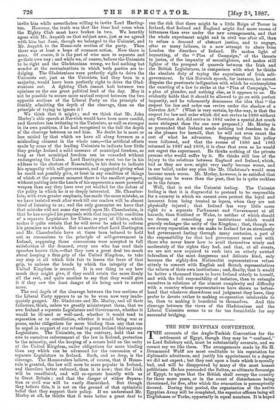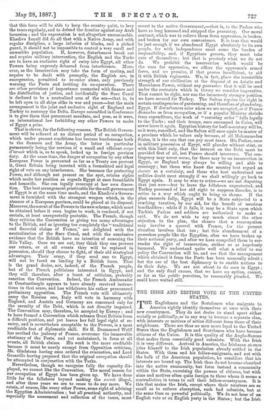THE NEW EGYPTIAN CONVENTION.
THE accounts of the Anglo-Turkish Convention for the settlement of Egypt, though they may be " confused," as Lord Salisbury said, must be substantially accurate, and we cannot say we like them. The arrangements made by Sir H. Drummond Wolff are most creditable to his reputation for diplomatic adroitness, and justify his appointment to a degree we did not expect ; but they rest upon a basis which is morally bad, and will be disapproved by many of the most honest politicians. He has persuaded the Sultan, as ultimate Sovereign of Egypt, to agree that the British shall occupy the country for three more years, or in the event of disturbances being threatened, for five, after which the evacuation is peremptorily decreed. During that period, the organisation of the native Egyptian Army will be completed, the superior officers being all Englishmen or Turks, apparently in equal numbers. It is hoped
that this force will be able to keep the country quiet, to levy the taxes regularly, and to defend the frontier against any Arab incursion ; and the expectation is not altogether unreasonable. Khedive Ismail did do all that with a Native Army, and with regular discipline, a large infusion of blacks, and a picked guard, it should not be impossible to control a very small and unwarlike population. If, however, disturbances break out and require military intervention, the English and the Turks are to have an exclusive right of entry into Egypt, all other Powers being expressly debarred from interference. More- over, as the insurrection may take the form of mutiny, and require to be dealt with promptly, the English are, in emergencies, permitted to re-enter alone, only previously warning the Porte and inviting its co-operation. There are other provisions of importance connected with finance and the distribution of justice, and incidentally the Suez Canal is declared to be a neutralised arm of the sea—that is, to be left open to all ships alike in war and peace—but the main arrangement is the joint and exclusive right of England and Turkey to reoccupy the Delta. Europe assembled in Conference is to give them that permanent mandate, and pass, as it were, an international law forbidding any other Powers to make of Egypt a prize.
That is clever, for the following reasons. The British Govern- ment will be relieved at no distant period of an occupation, which under present conditions has become burdensome both to the finances and the Army, the latter in particular permanently losing the services of a small and efficient corps d'armie which is, so to speak, locked up in foreign garrison duty. At the same time, the danger of occupation by any other European Power is prevented so far as a Treaty can prevent it, Great Britain being invested with a formulated and legal right of veto on any interference. She becomes the protecting Power, and although not present on the spot, retains rights which make her position as regards Egypt at once formidable and honorific. She can legally reoccupy at her own discre- tion. The best arrangement practicable for the self-government of Egypt is at the same time made, and the Khedive's Govern- ment is furnished with the strongest weapon which, in the absence of a European garrison, could be placed at its disposal. Moreover, the assent of the Powers to the new scheme, which must be obtained before it even begins to work, is rendered, if not certain, at least unexpectedly probable. The French, though they criticise the Convention as giving too many advantages to the British, and as ignoring too completely the " traditional and financial claims of France," are delighted with the neutralisation of the Suez Canal, and with the conclusive evidence that the British have no intention of annexing the Nile Valley. Once we are out, they think they can prevent our return, or at all events they will be replaced in possession, should they choose to fight, of their old strategical advantages. Their army, if they send one to Egypt, will not be faced on landing by a British force. That is the grand desire, not, indeed, of the French people, but of the French politicians interested in Egypt, and they will therefore, after a burst of criticism, probably sanction the Convention. Indeed, the French Ambassador at Constantinople appears to have already received instruc- tions in that sense, and has withdrawn his rather pronounced preliminary opposition. The French vote will ultimately carry the Russian one, Italy will vote in harmony with England, and Austria and Germany are concerned only for the security of the Debt, which is not directly impaired. The Convention may, therefore, be accepted by Europe ; and to have framed a Convention which releases Great Britain from a difficult position, and yet leaves her full legal right of re- entry, and is nevertheless acceptable to the Powers, is a most creditable feat of diplomatic skill. Sir H. Drummond Wolff has soothed the jealousy of France, overcome the immovable obstinacy of the Porte, and yet maintained, in form at all events, all British claims. His work is the more creditable because it must be nearly exempt from Opposition criticism, Mr. Gladstone having once ordered the evacuation, and Lord Granville having proposed that the original occupation should be attempted in conjunction with the Turks. Nevertheless, though we recognise fully the capacity dis- played, we cannot like the Convention. The moral reason for our occupation of Egypt has been given up. We have done little for the fellaheen beyond making the coracle illegal, and after three years we are to cease to do any more. We retain, of course, like every other Power, some right of advising the Egyptian Administration ; but all practical authority, and especially the assessment and collection of the taxes, must revert to the native Government,—that is, to the Pashas who have so long harassed and stripped the peasantry. Oar moral contract, which was to relieve them from oppression, is broken, and broken for our own convenience. It is true that would be just enough if we abandoned Egypt absolutely to its own people, for with independence must come the burden of responsibility, and, if Egyptians govern, they must take care of themselves ; but that is precisely what we do not do. We prohibit the insurrection which would be the cure for oppression, we officer the oppressor's armed force, and we promise, if that proves insufficient, to aid it with British regiments. We, in fact, place the irresistible strength of our civilisation at the disposal of an Asiatic and Mussulman Power, without any guarantee that it will be used under the restraints which in theory we consider imperative. That cannot be right, nor can the immensely stronger position we have secured for Turkey. The Sultan regains the right in certain contingencies of garrisoning, and therefore of plundering, Egypt. If disturbances arise when we are occupied, or if France dissuades us from occupation, or if a popular Ministry shrinks from expenditure, the work of "restoring order" falls legally to the Turks ; and their troops, once encamped in Cairo, will never leave it again. Egyptian history for half-a-century will be, as it were, cancelled, and the Sultan will once again be master of a province which he values only because, of all Mahommedan States, it is the one that can pay most taxes. His Pashas, once in military possession of Egypt, will plunder without stint, or with this limit only, that the interest on the Debt must be provided first of all, lest France should intervene. The con- tingency may never occur, for there may be no insurrection in Egypt, or England may always be willing and able to reoccupy ; but those who know the country best regard an eineute as a certainty, and those who best understand our politics doubt most strongly if we shall willingly go back to Egypt again. It may be wise to retire—we are not disputing that just now—bat to leave the fellabeen unprotected, and Turkey possessed of her old right to suppress disorder, is to retire in a way which ought to bring us shame. If the plan succeeds fully, Egypt will be a State subjected to a crushing taxation, by our aid, for the benefit of usurious bondholders ; while if it fails, it may be a State upon which Turkish Pashas and soldiers are authorised to make a raid. We do not wish to say much about the other objection to the plan, the chance that a reoccupation may involve a quarrel with France, for the present situation involves that too ; but this abandonment of a powerless people like the Egyptian, after we have broken up their national party, and after we have compelled them to sur- render the right of insurrection, strikes us as hopelessly immoral. We understand quite well what a relief to our policy the Convention will be, and see that the management which obtained it from the Porte has been unusually adroit ; but the use of the best diplomacy is to enable nations to do their duty. We are not about to do ours in Egypt ; and the only final excuse, that we have no option, cannot, so far as the public perceives, be reasonably pleaded. We could have waited still.



































 Previous page
Previous page